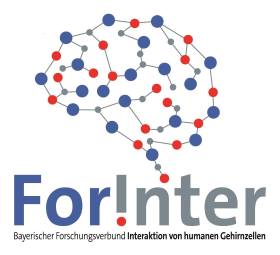ForInter
BAVARIAN RESEARCH ASSOCIATION INTERACTION OF HUMAN BRAIN CELLS

Neuron-oligodendrocyte interaction: glial pathology in neurodegeneration
The generation of myelin sheaths is a crucial requirement for fast nerve conduction velocity in which the development of the axo-oligodendroglial interface is highly complex and tightly regulated. However, the precise interaction between the axonal compartment and oligodendrocytes in humans remains still unknown. Interference with myelination leads to deficits of motor, sensory and cognitive functions in the central nervous system (CNS).
A profound loss of myelin sheaths has been observed in multiple system atrophy (MSA), a sporadic, rapidly progressing neurodegenerative movement disorder without causal or disease modifying therapy. Neuropathologically, MSA patients show an accumulation of alpha-synuclein (α-syn) within oligodendrocytes. This intra-oligodendroglial accumulation of α-syn is causally linked to the pathogenesis of MSA. Overall, we hypothesize that an increased accumulation of α-syn interferes with myelination and consequently leads to axonal degeneration.
The aim of this project is to examine the influence of intra- oligodendroglial α-syn accumulation on maturation and/or myelination of human oligodendrocytes. To this end, a co-culture system of human oligodendrocytes and cortical glutamatergic neurons will be developed, both cell types generated from human induced pluripotent stem cells (hiPSC). The MSA associated intra- oligodendroglial α-synocleinopathy will be modelled by cell-autonomous overexpression of α-syn in human oligodendrocytes or exogenous application of recombinant human α-syn. The interference of α-syn with the maturation and/or axonal myelination will be analyzed in this novel human co-culture system.
By using potential pro-myelinogenic compounds we will examine whether deficits of maturation and/or myelination are restored. In parallel, a clinician scientist will develop specific imaging modalities both for in vivo preclinical MSA models and MSA patients. The most promising pro-myelinogenic compound based on the results obtained by the co- culture system will be explored in MSA models and may ultimately lead to a clinical trial in MSA.
This dual approach - developing a human co-culture system in conjunction with modern imaging modalities for myelin - will be an important translational step towards a potential therapy in MSA.
Project lead:
Prof. Dr. Juergen Winkler
Department of Molecular Neurology
Team:
Project partners:
- Friedrich-Alexander-Universität Erlangen-Nürnberg



